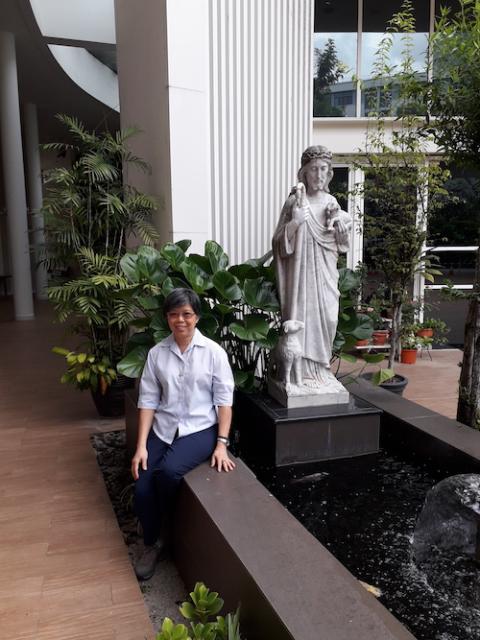
Good Shepherd Sr. Agnes-Claire Koh poses in front of the Good Shepherd Sisters' main convent; public housing can be seen in the background. (Provided photo)
Sr. Agnes-Claire Koh and her Good Shepherd Sisters continue to carry out the legacy of their congregation's founder, St. Mary Euphrasia Pelletier.
St. Mary Euphrasia was inspired by the Gospel message of the good shepherd (Luke 15:3-7; John 10:11-18) who seeks the suffering, heals the sick and carries the weak. The French nun founded the Good Shepherd Sisters in 1835 to reach out to orphans, girls and women living at the margins of society.
Sister Agnes-Claire said St. Mary Euphrasia's mission continues today in Singapore with the Good Shepherd Sisters, who founded the Good Shepherd Centre in 1986. Throughout the years, the center has sheltered women and children fleeing from family violence, migrant domestic workers abused by their employers, and women who were trafficked for the sex trade in Singapore.
Born in Singapore to a traditional Chinese family in November 1962, Sister Agnes-Claire has been a Good Shepherd sister for 28 years. Her family has been Catholic for many generations. She has a younger brother who is a priest of the Congregation of the Immaculate Heart of Mary.
Sister Agnes-Claire, who is the resident manager of the Good Shepherd Centre, talked with Global Sisters Report about her ministry during COVID-19 lockdown and her reflection on how abused women have taught her to be true to her vocation.
Advertisement
GSR: Tell us about the Good Shepherd Centre and how it has evolved since 1986.
Sister Agnes-Claire: We can accommodate, at most, 40 women and children. The profile of our residents changes often, as we seek to be relevant by responding to the needs of our society.
When we first started this ministry, we were helping mostly Singaporean women abused by their spouses. Year by year, foreign-born wives seeking shelter kept increasing, as they did not have the community to support them.
It was tough at first, helping foreign women, because of immigration laws. They came in the country on the Dependant's Pass or Long Term Visit Pass, which might be valid for a year or more. They needed their spouses to sponsor them to extend their stay in Singapore.
Imagine: On the one hand, they depended on their spouse for immigration papers. On the other hand, they submitted themselves to daily abuses. Their children would be Singapore's citizens. If the women escaped to their home country, their children became foreigners in their mothers' homeland.
Another group of residents were migrant domestic workers from various Asian countries. We opened our center to help them for about 25 years. A few years ago, the Singapore government built a large complex for these abused workers. We gave up this service unless the worker was referred to us if she was severely abused and needed emotional and psychological support.
The migrant women who came to our center were from the age of 16 to early 40s. They thirst for learning and are willing to work hard. They remain positive in their outlook, even though they suffered greatly from the hands of their employers. I admire their resilience, their never-say-die attitude, their courage for leaving their country and family to come here without any skills. We deem them as having the least social and community support, making our charism very relevant for today — the sheep that our Good Shepherd would seek out to bring back to his fold.
In 2010, Singapore established an Inter-Agency Taskforce on Trafficking in Persons to combat trafficking. It is co-led by the Ministry of Home Affairs and the Ministry of Manpower. Many women would be trafficked for the sex trade from all parts of Asia to our country. In 2012, they asked us to be the designated center to house the victims of such cases.

International women and children at Good Shepherd Centre in Singapore pose together before the pandemic began. (Provided photo)
Can you talk about these women or the violence against them?
Family violence can happen anywhere, to anyone in any ethnic group, and in any country. It cuts across any social strata. We chose to help those who are in the lower income group because they would have the least financial means to rent another safe place.
Here is a story of one such woman. May came from Vietnam. She married a Singaporean man twice her age. When she first met the man, he was well-dressed with long-sleeved shirt and buttoned-up collar. It was after the marriage that she realized why he wore long sleeves and buttoned-up collar: He had a full-body tattoo. He was also a drug addict.
After May was given a Long Term Visit Pass, she looked for a job because he was unemployed and his parents supported his addiction. She met a very kind employer who gave her flexible hours so she could look after her two daughters. During the COVID-19 lockdown, she was given half her salary, even though the shop was closed for a month.
However, whenever her husband was low on cash, he would become violent not only to her, but also his parents. She constantly lived under this hypervigilant state because he was unpredictable. She would never know when he would hit her or her two young daughters. May managed to run away after much planning with her community social worker.
With her two daughters, May is starting a new life with counseling to work through her trauma. They participate in dancing, expressive art and therapeutic programs. For May, the programs help her deal with trauma from the violence and, for the children, the trauma of witnessing their mom being beaten.

English class at the Good Shepherd Centre in Singapore during COVID-19 lockdown (Provided photo)
Talking about the pandemic, how is your center dealing with the situation?
We run the center with a team of six staff, including me. We do shift work, sleepover duties, take turns to work on weekends and public holidays. With COVID-19, we divided our team into two units to ensure continuity should we have a COVID-19 victim.
Since the lockdown, our residents were not able to go out except to see a doctor. Those who were working had to work from home. Schools were closed, so children were doing home-based learning.
We take temperatures of both staff and residents twice a day and disinfect our high-touch surfaces three times a day. Residents have to wear masks and practice social distancing in common areas like the sitting, TV and dining rooms. As for the residents' rooms and toilets, they clean them twice a day. Since they cook their own meals, they have their cooking schedule to observe social distancing. Our staff shop for groceries for the residents, while some order online.
It was tough implementing these restrictions in the beginning, as we were all new to these practices. However, we carried out these practices for our safety and the safety of others.
Not being able to go out was difficult. Our programs had to be conducted in groups of less than 10 people. The staff had to repeat the same program two or three times, depending on the group size.
On top of this, we are a melting pot of residents from India, Vietnam and Bangladesh. Our Singaporean residents are ethnic Chinese, Malay and Indians. Living together with different cultures under the lockdown is a daily challenge. But we keep in mind what St. Mary Euphrasia reminded us: to be attentive and sensitive to cultures, countries and different needs. We are kept busy, and we are glad to provide an essential service to women and children in need.
Can you give a reflection on your ministry for abused women?
I have always been involved in residential care for girls and women. After I made my first profession on Aug. 15, 1992, I was assigned to Marymount Teenage Center. I went in with fear and trepidation.
I came from a very sheltered upbringing where we were respectful to our elders and we studied hard to make a life for our future. We went to church every Sunday and prayed the rosary every night. We were not rich, but we worked hard.

Good Shepherd Sr. Agnes-Claire Koh sits outside by the Good Shepherd statue in front of the chapel (Provided photo)
In the teenage center, I first encountered girls who were so different from me when I was a teenager. They were loud, aggressive and had no qualms to challenge anyone in authority. Some were gang members, runners for loan sharks, glue sniffers, rioters, and truants from schools. Others were physically or sexually abused.
Looking back, I would say they trained me to be a good shepherd. They challenged my call to love and serve the poor, care for the sick, reach out to the downtrodden. Every night after my shift, I would go to my room and could only kneel on the floor, asking for help from Jesus, the good shepherd, and my foundress. I felt helpless and lost.
Slowly, I learned to look beyond their behavior, to listen to their fears, pain and struggles in their young lives. They were saying, "Would you still love me, care for me even though I am difficult? Are you for real? That you would not reject me even though I am badly behaved? My parents did not want me, so why would you be different?"
Those were trying years, learning to understand them and learning that their behaviors were not targeted at me. Those years with teenagers helped me become more understanding, more compassionate, wiser, firm and yet gentle. I love working for these young ladies, and I am so proud of who they have become today. I also thank them for the lessons they taught me. They are my benefactors, teaching me to become a more compassionate Good Shepherd sister.
Currently, I am serving in the Good Shepherd Centre. This is my third term (2004 to 2009, 2012 to 2017, 2019 to present). As I reflect on my time, I am grateful to God for this ministry. I am privileged to witness their growth from being broken to being able to stand tall and build a life for themselves and their children. In this ministry, I can see God's hands guiding me in my work. My foundress, St. Mary Euphrasia, called it "the grace of office."
In our center, we use a lotus as our symbol. The flower thrives in stagnant water. We know these women come from very difficult situations in their lives. Yet, just like the lotus, they can still grow and bloom into a beautiful flower in the midst of their difficulties. To me, these women are not just victims; they are survivors, each as beautiful as the other.

Lotus flower (Unsplash/Annie Spratt)
[Peter Tran is assistant director of the Redemptorist Renewal Center in Tucson, Arizona.]






